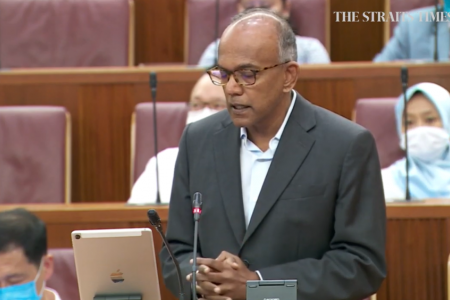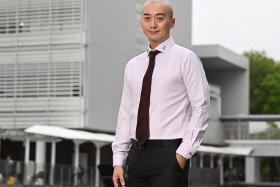Permanently banning cheating trainee lawyers from the Bar may be too harsh: Shanmugam
Trainee lawyers who cheated in the 2020 Bar examination should face significant sanction to reflect the seriousness of their conduct, but to permanently prevent them from being called to the Bar may be too harsh.
Law and Home Affairs Minister K. Shanmugam said this in Parliament on Monday (May 9) in response to questions by MPs over the recent revelations that 11 aspiring lawyers had cheated in the 2020 Bar exam known as Part B.
Ms He Ting Ru (Sengkang GRC) asked whether the punishments meted out were sufficient, while Mr Seah Kian Peng (Marine Parade GRC) asked about second chances.
Mr Shanmugam said the message has to be sent out to others that cheating by trainee lawyers will be dealt with very seriously.
"At the same time, what is the right penalty?" he asked.
"These are young people. Does that mean that you forever prevent them from practising? I think most people will say that would sound very harsh."
Mr Shanmugam stressed that he was being careful about what he says because the applications of the trainee lawyers to be admitted to the Bar are still before the court.
The cases of cheating were first revealed in written grounds by High Court judge Choo Han Teck on April 18.
Justice Choo said he had adjourned the applications by six aspiring lawyers to be called to the Bar after the Attorney-General objected to their admission because they had cheated in the Part B exam.
Five of them, who had shared answers on messaging platform WhatsApp, had their applications adjourned for six months.
The other, who was found to have colluded with another candidate, had hers adjourned for a year.
The next day, the Attorney-General's Chambers revealed that the Attorney-General was considering another five applications.
Those who cheated had to retake the relevant papers and they passed the following year.
On Monday, Mr Shanmugam reiterated that the applicants will need to convince all stakeholders that they are fit and proper to practise law before they are allowed to do so.
The High Court has the discretion to rule on the admission applications, taking into account the views of the Attorney-General, the Singapore Institute of Legal Education (Sile) and the Law Society.
On whether there were cases of cheating in prior and subsequent years, Mr Shanmugam replied that Sile has said it has not found any other instances apart from the 11 cases.
"There is a difference between whether it has happened and what they found. But they haven't found anything else," he noted.
Mr Seah asked why safeguards, such as remote proctoring for examinations that are conducted online, were not put in place earlier.
Mr Shanmugam replied: "I assume that they perhaps expected lawyers to be more honest than has turned out to be the case, at least with regard to some of them."
He added that before the Covid-19 pandemic, exams were usually conducted physically, so Sile may not have that much experience conducting it in an online format.
Ms Hany Soh (Marsiling-Yew Tee GRC) asked whether the trainee lawyers who cheated should continue to be closely supervised and made to serve the community.
Mr Shanmugam said: "I don't think you need to have close supervision to know that you're not to be cheating in an exam."
He said there was some merit in requiring them to do some community service.
However, he said these were not matters to be decided as a matter of policy, but for the Attorney-General's Chambers and the Law Society to suggest and for the courts to decide on the specific cases.
Get The New Paper on your phone with the free TNP app. Download from the Apple App Store or Google Play Store now


